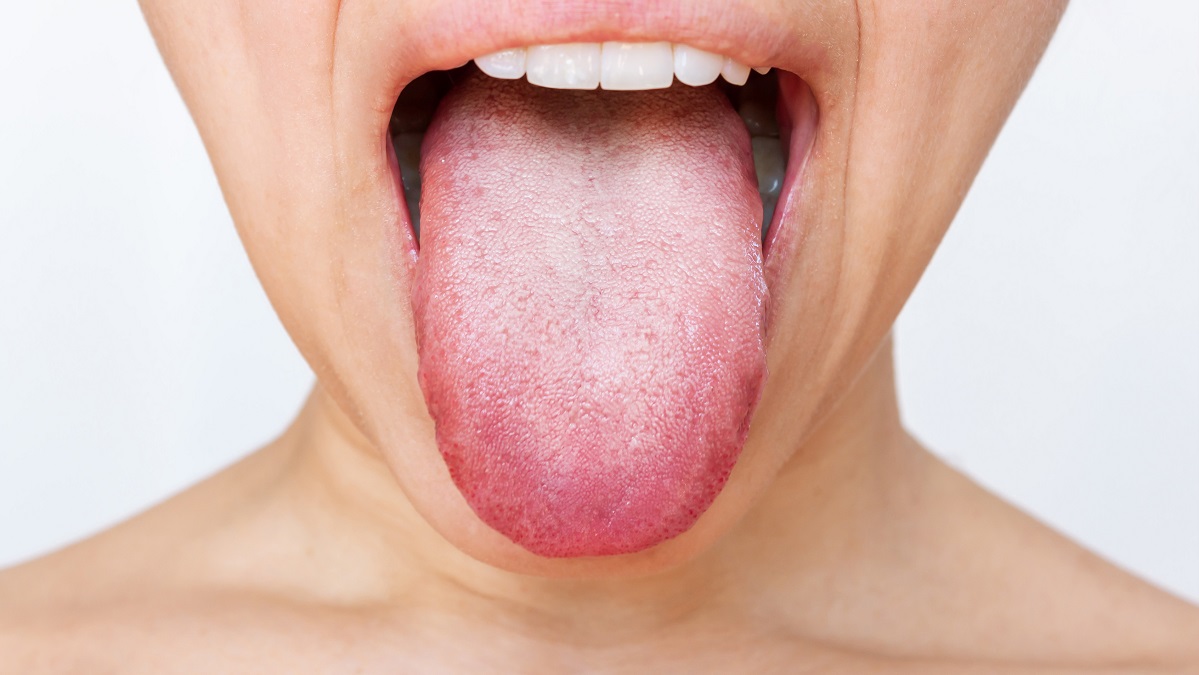How often do you start the day by inspecting your tongue in the mirror? It sounds like an odd question, but the colour, texture and appearance of this muscular organ can tell you a lot about your overall health.
A happy, healthy tongue tends to be pink and dotted with small nodules and, if not, something might be up.
From a fuzzy coating to painful sores, we asked Dr Uchenna Okoye to outline some telltale signs and changes in your tongue, and what they might mean.
1. A puffy or thin tongue
“If the tongue is puffy, with teeth marks, it can indicate a lack of nutrients and moisture,” says Dr Okoye. “A very thin tongue could indicate you need to drink more water, too.”
2. A change in colour
If your tongue looks darker in colour than usual, it could be a sign something’s amiss. “A red tongue may represent heat in the body, such as a fever or a hormonal imbalance that’s leading to hot flushes or temperature changes,” says Dr Okoye. “However, it can also indicate a vitamin B12 deficiency.”
The most common cause of a purple tongue is staining from certain foods and beverages. However, it could be caused by something more serious. “A purple tongue is a sign the circulatory system is not working as well as it should be, so I’d recommend getting this checked out by a GP,” says Dr Okoye.
You should also see your doctor if you have an unusually pale tongue, Dr Okoye explains, as that can be a sign of a vitamin or mineral deficiency: “This is common in anaemia sufferers, or after a long-standing disease where the immune system might be weak.”
3. A coating to the tongue
“A thick coating is often considered reflective of poor gut health,” says Dr Okoye, and while a thin coating is normal, it shouldn’t be non-existent. “A very thin or absent tongue coating can signal dehydration.”
Dr Okoye says the colour of the coating is important, too. “An unpleasant yellow, grey or even black coating can signal infection or bacterial build-up.”
A thick white coating, meanwhile, can indicate a yeast infection. “Most often it is due to candida, that causes oral thrush,” says Dr Okoye, “but you can find it in people with weakened immune systems or even after antibiotics.”
4. Bumps or lesions
It’s important to take note of tongue texture, too. “A bump on top of the tongue could be a warning of a bacterial or viral infection, or of an allergic reaction to a food or medication,” says Dr Okoye.
“Cold sores pop up most often on the underside of the tongue, and can be identified by a round, red border and yellow or white centre.”
If you have a white or grey sore with a hard surface that feels thick and raised, it could be leukoplakia, says Dr Okoye – a condition most frequently caused by irritation from dentures, crowns, fillings or smoking. It can affect your gums, too.
“It can – rarely – be an early indication of cancer, so should be checked out.
If you spot patchy lesions on the tongue that seem to change location from day to day, you may have a harmless, but sometimes uncomfortable, condition called geographic tongue.”
5. Grooves or wrinkles
“A tongue that bears grooves or wrinkles could be scrotal tongue, a harmless condition that can make it difficult to keep the tongue clean,” says Dr Okoye.
“It’s important to brush the tongue when brushing your teeth, because most of the bacterial growth in a person’s mouth is at the back of the tongue.”
To clean your tongue, Dr Okoye advises placing a pea-sized amount of toothpaste on your tongue scraper or toothbrush and gently running it over the surface of your tongue, giving it a little time to combat any bacteria.
“I’d recommend doing this two to three times a week,” Dr Okoye says. “If you have a sensitive gag reflex, it can make you gag, so it’s best to start from the back of the tongue and swipe in one go to the front. You’ll be amazed at what comes out.”
Have you ever noticed any changes in your tongue? Do you clean your tongue? Why not share your tips in the comments section below?
Also read: Lymph node swelling explained
Health disclaimer: This article contains general information about health issues and is not advice. For health advice, consult your medical practitioner.

